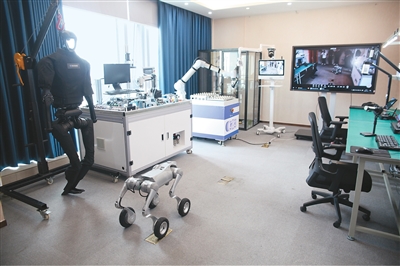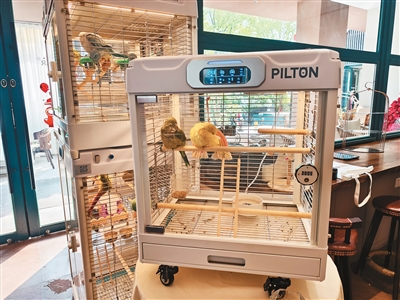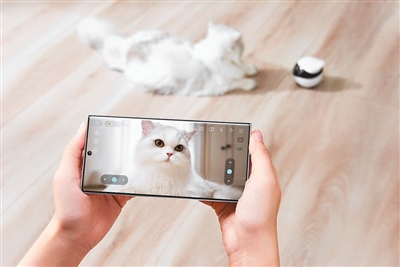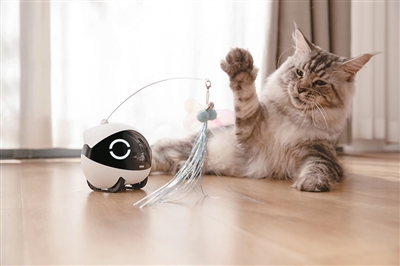




- BRNN
- BRI News
- BRNN News
- Database
Official Documents Polices and Regulations
Inter-government Documents International Cooperation BRI Countries
Business Guide Economic Data BRI Data
Trade
Investment Projects Latest projects
Cases - Content Pool
In recent years, intelligent pet products have entered an increasing number of households in China. The devices range from multifunctional smart cabins with air circulation and temperature control to online veterinary consultations and smart companion robots that play with pets.
As consumer preferences evolve from meeting basic needs to addressing pets' health and emotional well-being, demand for smart pet care solutions has grown rapidly, unlocking vast market potential.

A robotics lab at Chongzhiling, an AI-powered pet health management platform under EX Future Technology Group, displays humanoid robots, robotic arms, AI workstations and monitoring screens. (Photo courtesy of the interviewee)
Lu Fan, founder of the startup Pilton, returned from the Pet Fair Asia, expressing confidence in the company's future. His company, which specializes in smart pet cabins integrating air purification, feeding, temperature control and interactive functions, has participated in the exhibition three times since its founding more than three years ago.
"Our booth expanded from 50 to 200 square meters, and our products drew more pet owners," Lu said.
The inspiration behind Pilton's innovation came from a common problem. "Four years ago, I noticed some pet shops had strong odors. The pets were cute, but customers didn't stay long, which naturally hurt sales," Lu recalled.
Recognizing odor control as an industry pain point, Pilton collaborated with several labs and companies to analyze the gases produced by pet waste. They found that ammonia, nitrogen and hydrogen sulfide were the main causes of irritation.
"Using nanotechnology, we applied catalysts for these gases to the filter cores, creating a closed-loop air purification system," Lu said.
Priced at more than 2,000 yuan (about $280), Pilton's products are more expensive than traditional wooden pet cabinets. Yet Lu believes the added value is clear, as traditional models only offer display functions, while smart cabins provide pets with a much better living environment.

A smart bird cabin developed by Pilton, a startup specializing in smart pet cabins. (Photo courtesy of the interviewee)
Enabot Technology has developed intelligent companion robots equipped with remote control, mobility, cameras, voice communication and photo-taking capabilities.
"After rounds of design and refinement, our robots have become excellent playmates for many pets," said marketing director Tong Shaonan.
AI has also entered veterinary services. Chongzhiling, an AI-powered pet health management platform under EX Future Technology Group, began building its online and offline consultation system in 2019.
"Through continuous consultations and treatments, we've collected vast amounts of medical, image and model data, giving us a strong foundation for upgrades," said Liu Congkai, chairman of EX Future Technology Group.
Leveraging its strengths in data and algorithms, the company has developed a pet health care model for intelligent consultation services. "Our intelligent agent provides 24/7 diagnostic services with high accuracy. It improves efficiency and delivers personalized health solutions for users," Liu said.
Industry observers note that younger pet owners now prioritize emotional companionship, scientific care, and quality living over basic feeding, driving demand for innovative pet products.
To address concerns over electric shock risks and cleaning difficulties, Enabot Technology recently launched a pet water fountain with a simplified design that disassembles easily and connects to its companion robot.

A pet companion robot developed by Enabot Technology captures photos and transmits them to a mobile app. (Photo courtesy of the interviewee)
When a pet drinks, the fountain sends a signal prompting the robot to capture the moment. According to Tong, owners often struggle to take appealing photos of their cats drinking because of the tricky angles, and the robot's low-level perspective solves that perfectly.
Currently, expanding product categories and building comprehensive ecosystems have become a shared goal among many smart pet product companies.
Pilton has extended its product line beyond cats and dogs to small pets. "Gen Z pet owners tend to make more individualized choices. Many prefer keeping lizards, rabbits or parrots." Lu said, adding that these pets require specialized cabins since they stay in fixed locations for long periods, even when owners are home.
Pilton's smart bird cabin, for example, gives owners habitat customization options. "We can create desert scenes for lizards or forest environments for birds, adding more fun," Lu said. "Continuous innovation keeps users engaged and increases product value."
"In the future market, pet products will gradually evolve from semi-intelligent to fully intelligent, relying more heavily on algorithms and intelligent agents," Liu predicted. "We can use industry-leading multimodal large language model technology to build an 'intelligent brain' for the pet industry."

A cat interacts with a pet companion robot developed by Enabot Technology. (Photo courtesy of the interviewee)
EX Future also plans to open its software platform to partners, co-developing a new smart pet care ecosystem.
"Thanks to advanced technologies, future intelligent pet products will incorporate 'language' translation features. For instance, large language models may even interpret the meanings and emotions behind pets' vocalizations, helping humans better understand their furry companions," Liu added.
Overseas markets are also attracting the industry's attention. Enabot Technology, which sold its first-generation products abroad, now has over 1 million users in more than 160 countries and regions. Overseas sales account for 60 percent of its revenue, covering North America, Europe, Japan, South Korea, Australia and Southeast Asia.

Tel:86-10-65363107, 86-10-65368220, 86-10-65363106